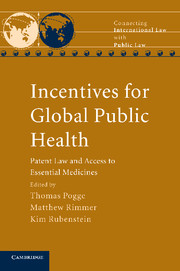Book contents
- Frontmatter
- Contents
- Contributors
- Series Editors' Preface
- Editors' Preface
- Introduction: Access to essential medicines: public health and international law
- Part I International trade
- Part II Innovation
- 5 The Health Impact Fund: better pharmaceutical innovations at much lower prices
- 6 The Health Impact Fund: a critique
- 7 A prize system as a partial solution to the health crisis in the developing world
- 8 Innovation and insufficient evidence: the case for a WTO–WHO Agreement on Health Technology Safety and Cost-Effectiveness Evaluation
- Part III Intellectual property
- Part IV Healthcare
- Bibliography
- Index
8 - Innovation and insufficient evidence: the case for a WTO–WHO Agreement on Health Technology Safety and Cost-Effectiveness Evaluation
Published online by Cambridge University Press: 04 August 2010
- Frontmatter
- Contents
- Contributors
- Series Editors' Preface
- Editors' Preface
- Introduction: Access to essential medicines: public health and international law
- Part I International trade
- Part II Innovation
- 5 The Health Impact Fund: better pharmaceutical innovations at much lower prices
- 6 The Health Impact Fund: a critique
- 7 A prize system as a partial solution to the health crisis in the developing world
- 8 Innovation and insufficient evidence: the case for a WTO–WHO Agreement on Health Technology Safety and Cost-Effectiveness Evaluation
- Part III Intellectual property
- Part IV Healthcare
- Bibliography
- Index
Summary
Introduction
Health technology (particularly including pharmaceuticals and medical devices) constitutes an increasingly important item of international trade regulated by rules developed in large part by the World Trade Organization (‘WTO’). Affordable access to such technologies long will remain a critical factor in national responses to infectious disease pandemics, as well as the prevention of morbidity and mortality associated with disease, war and natural disaster. For many people such equitable access will continue to be a basic precondition to health. All nations have developed regulatory processes for scientifically assessing the public health impacts of such health technologies – mostly in relation to safety issues, but often concerning their cost-effectiveness or health innovation (that is, their objectively demonstrated therapeutic significance to a community).
The causes and social impacts of the current global financial crisis have heightened concerns about both the safety and cost-effective pricing issues associated with the development of, and global trade in, new health technologies for profit by private multinational corporations. The WTO has already forged an agreement utilizing scientific assessment of evidence to protect the public interest in relation to international trade of one group of products (quarantine and phytosanitary regulatory measures concerned with agricultural trade). This is the Agreement on the Application of Sanitary and Phytosanitary Measures (‘SPS Agreement’). The WTO has yet to seriously consider developing an Agreement on Health Technology Safety and Cost-Effectiveness Evaluation (‘HSCE Agreement’).
- Type
- Chapter
- Information
- Incentives for Global Public HealthPatent Law and Access to Essential Medicines, pp. 209 - 232Publisher: Cambridge University PressPrint publication year: 2010



